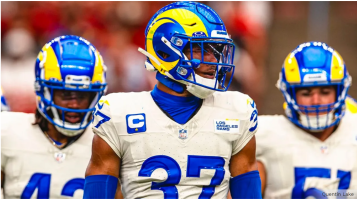MuscleMecca Crew
MuscleMecca Crew
Staff
Author
- Joined
- May 11, 2012
- Messages
- 3,797
- Points
- 83
As a pivotal figure in the Los Angeles Rams’ defense, safety Quentin Lake has solidified his reputation through a rigorous, detail-oriented training program. His regimen prioritizes strength, agility, and mental sharpness, equipping him to thrive in the demanding landscape of the NFL.
Lower Body Strength and Stability
Lake’s dedication to lower body development is showcased in his structured daily schedule. Each morning begins with two hours of weightlifting (8–10 a.m.), followed by two hours of on-field drills (10 a.m.–12 p.m.) to translate strength into football-specific actions. A cornerstone of his routine is the Pit Shark machine, which shifts weight loading from the spine to the hips, minimizing injury risk while maximizing power. This technique allows Lake to safely lift up to 600 pounds, amplifying his explosiveness and stability on the field.
Isometric Exercises for Muscle Endurance
Lake integrates isometric holds to bolster muscle endurance and joint stability. One standout drill involves gripping heavy kettlebells with an elevated front foot, holding the position for 30 seconds. This targets key muscle groups like the hamstrings and quads while refining balance—a critical skill for a defensive back.
Single-Leg Movements for Functional Strength
Recognizing the unilateral demands of football, Lake prioritizes single-leg exercises. These drills mimic in-game scenarios where players pivot, tackle, or sprint on one leg, enhancing functional strength and reducing imbalances that could lead to injuries.
Core Strength and Injury Prevention
A fortified core is central to Lake’s ability to absorb contact and maintain control during high-speed plays. His core workouts focus on dynamic stabilization, which not only improves performance but also mitigates the risk of soft-tissue injuries common in defensive roles.

Nutrition: Fueling Performance
Lake’s diet is tailored to sustain his intense training load and recovery needs:
Lake complements physical training with mental discipline. Regular 2–4 mile runs serve dual purposes: boosting cardiovascular health and offering mental clarity. These sessions act as a meditative practice, fostering focus and resilience. As a third-year team captain, Lake emphasizes positivity, using affirmations to motivate teammates and cultivate a unified, high-performing defense.
Sources
THERAMS.COM
Lower Body Strength and Stability
Lake’s dedication to lower body development is showcased in his structured daily schedule. Each morning begins with two hours of weightlifting (8–10 a.m.), followed by two hours of on-field drills (10 a.m.–12 p.m.) to translate strength into football-specific actions. A cornerstone of his routine is the Pit Shark machine, which shifts weight loading from the spine to the hips, minimizing injury risk while maximizing power. This technique allows Lake to safely lift up to 600 pounds, amplifying his explosiveness and stability on the field.
Isometric Exercises for Muscle Endurance
Lake integrates isometric holds to bolster muscle endurance and joint stability. One standout drill involves gripping heavy kettlebells with an elevated front foot, holding the position for 30 seconds. This targets key muscle groups like the hamstrings and quads while refining balance—a critical skill for a defensive back.
Single-Leg Movements for Functional Strength
Recognizing the unilateral demands of football, Lake prioritizes single-leg exercises. These drills mimic in-game scenarios where players pivot, tackle, or sprint on one leg, enhancing functional strength and reducing imbalances that could lead to injuries.
Core Strength and Injury Prevention
A fortified core is central to Lake’s ability to absorb contact and maintain control during high-speed plays. His core workouts focus on dynamic stabilization, which not only improves performance but also mitigates the risk of soft-tissue injuries common in defensive roles.

Nutrition: Fueling Performance
Lake’s diet is tailored to sustain his intense training load and recovery needs:
- Breakfast: Protein-rich eggs to jumpstart muscle repair.
- Snacks: Fruit, yogurt, and granola for sustained energy.
- Lunch: Chicken and pasta to replenish glycogen and support lean muscle.
- Dinner: Ground beef and rice, providing essential amino acids and carbs for overnight recovery.
This structured meal plan helps him maintain his optimal playing weight of 195 pounds.
Lake complements physical training with mental discipline. Regular 2–4 mile runs serve dual purposes: boosting cardiovascular health and offering mental clarity. These sessions act as a meditative practice, fostering focus and resilience. As a third-year team captain, Lake emphasizes positivity, using affirmations to motivate teammates and cultivate a unified, high-performing defense.
Sources
THERAMS.COM














